Mobile Menu

Lauryn Seering
All-women legal podcast makes its debut today

Four attorneys from three major secular organizations are launching today, May 18, the only legal affairs show for atheists, agnostics and humanists hosted completely by women lawyers.
“We Dissent” will discuss religious liberty in federal and state courts and the work these attorneys do to keep religion and government separate. The co-hosts are Rebecca S. Markert, legal director at the Freedom From Religion Foundation, Elizabeth Cavell, associate counsel at FFRF, Alison Gill, vice president for legal and policy at American Atheists, and Monica Miller, legal director and senior counsel at the American Humanist Association. The podcast began taping episodes in January, so there’ll be a few more dropping on Wednesdays for the next couple of weeks, but then it’ll be once a month starting in June.
In the first episode, Cavell, Markert, Gill and Miller discuss the “sleeper case” of the Supreme Court term that could upend prohibitions on government funding to religious schools. The lawyers break down the arguments from the voucher case out of Maine, Carson v. Makin, and discuss ramifications and potential outcomes. Cavell acts as the “showrunner” for this first episode — she did the background research, outlined the episode and was the main host. Each episode will have a co-host acting as the showrunner for the particular issue and will rotate through the organizations.
In the second episode, the four co-hosts review Shurtleff v. City of Boston, in which the city of Boston denied a religious organization, Camp Constitution, its request to fly the Christian flag at city hall. The hosts discuss the free speech and religion clause arguments presented at oral arguments last December. Note: This episode was recorded prior to the Supreme Court handing down the decision on May 2. An update to this episode is forthcoming.
In the third episode, Gill, Markert and Miller discuss another tool in the kit to keep religion and government separate: legislative advocacy. As the resident policy expert, Gill guides us through the many bills wending their ways through state legislatures this year that threaten church/state separation.
The podcast will hence explore religious liberty cases currently before the U.S. Supreme Court and at other federal courts across the country. The attorney hosts will also discuss other advocacy work undertaken to help atheists and other nonreligious people outside the courtroom.
Markert is elated that she’s played a key role in putting together such a distinctive podcast.
“I’m really excited how this all came together. We wanted to highlight the fact that there are so many powerful secular women doing a lot of the work to keep religion out of government,” says Markert. “Women lawyers have prominent roles in our national organizations and their voices deserve to be heard.”
The co-hosts thank FFRF staff members James Phetteplace and Greta Martens for their production support and work in helping get “We Dissent” off the ground.
We Dissent is available wherever you get your podcasts. The podcast’s website is we-dissent.org. You can also keep up to date with We Dissent on Facebook by clicking here or follow us on Twitter @we_dissent.
Tune in — starting now — for an incisive podcast that offers a fresh legal critique from a particular perspective.
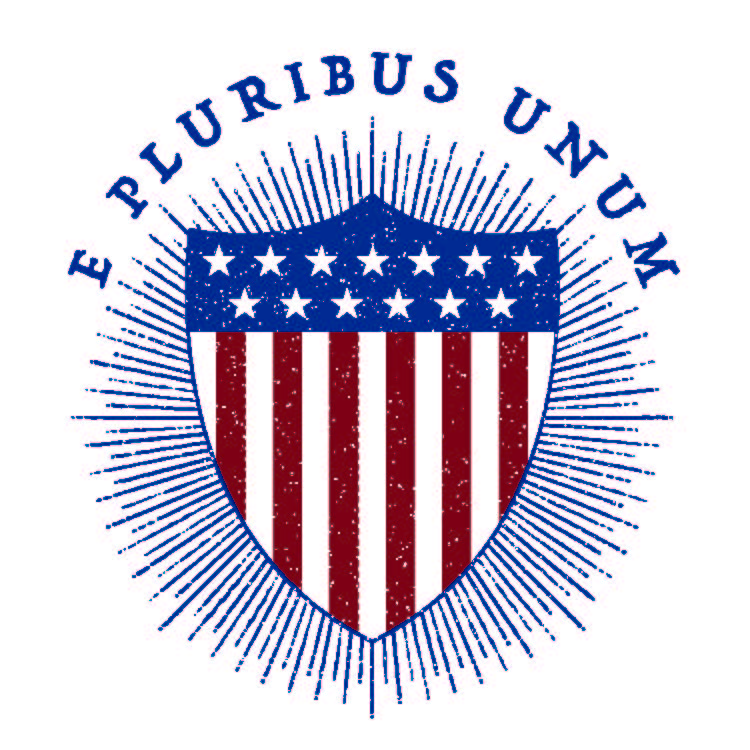
The Freedom From Religion Foundation has mailed decals boasting America’s original motto, “E Pluribus Unum,” to the city of Haven, Kansas, to counter “In God We Trust” stickers on police cars there.
The national watchdog, in a letter to Mayor Adam Wright, notes that the city council on May 2 did the right thing by asking the local police department to remove “In God We Trust” decals from vehicles. It also voted to stop using its official Facebook page to promote Christianity.
Unfortunately, the council immediately caved to a backlash, and reversed course, allowing the godly decals to remain on the vehicles — with the condition that similar messages supporting other beliefs would also be allowed.
Thus FFRF is mailing its decal featuring the original secular motto, “E Pluribus Unum” (“out of many, [come] one”), which celebrates diversity and pluralism, not religious orthodoxy.
FFRF Co-President Annie Laurie Gaylor notes that “In God We Trust” is “a johnny-come-lately usurper” adopted by Congress during the Red Scare for all the wrong reasons. With almost 30 percent of Americans today identifying as nonreligious or unaffiliated, the motto isn’t even accurate.
“To be accurate, it would need to say, ‘In God Some of Us Trust,” and wouldn’t that be a silly motto?” Gaylor asks.
FFRF notes that placing a godly motto on police cars also amounts to an unconstitutional religious test for police officers, some of whom are likely not religious.
“Citizens of Haven trust their law enforcement officers to attend to their secular duties,” reads FFRF’s letter. “In a time when citizens nationwide are increasingly distrustful of law enforcement officers’ actions, it is frightening and politically dubious for the city to reaffirm to citizens that officers rely on the judgment of a deity rather than on the judgment of the law, or to feel if they are not religious or not Christian that they will be treated as undesirables or second-class citizens by armed police.”
While urging the city to stand by its original decision and respect the rights of conscience of all citizens, including those who reject belief in a god, FFRF is supplying the city with its classic “E Pluribus Unum” decals. FFRF produced them in 2020 as a reaction to the Jan. 6 insurrection.
“Let us know if you need more,” Gaylor invites.
FFRF is a national association of freethinkers (atheists and agnostics), which works for separation of church and state. FFRF has more than 36,000 members, including more than 180 in Kansas.
Breaking! FFRF wins lawsuit against praying W.Va. city council that ‘wrapped itself in a single faith’
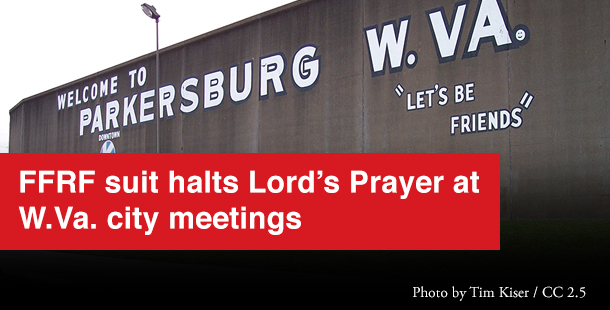
The Freedom From Religion Foundation and two of its members have won a federal court challenge against a West Virginia city that, according to the ruling, “wrapped itself in a single faith” by opening with the Lord’s Prayer.
U.S. District Judge John T. Copenhaver, Jr. issued a 30-page decision today in FFRF’s favor. He permanently enjoins the city of Parkersburg from continuing its practice of reciting the Lord’s Prayer at each city council meeting. The decision declares the practice unconstitutional, awards each plaintiff nominal damages, and allows the plaintiffs to seek attorneys fees.
“The City Council’s prayer practice most clearly runs afoul of the Fourth Circuit’s concern with identifying the government with a single preferred religious sect,” writes Copenhaver.
The 4th Circuit U.S. Court of Appeals, which has jurisdiction over West Virginia, had previously struck down Christian prayers recited by county commissioners. The opinion by Copenhaver concludes under that analysis: “[T]he City Council wrapped itself in a single faith.”
As the ruling explains: “That is exemplified by the unduly heightened risk of coercion by the state by virtue of the governmental identity of the prayer-givers acting in unison, the invariable nature of the sectarian prayer that is associated with and endorses Christianity, and the implicit and sometimes express invitation to the public in attendance to join in, all in the relative intimacy of a local government setting. It is the combination of these factors — the totality of the circumstances — that renders the prayer practice of the City Council impermissible.”
In 2018, FFRF and two of its local members had sued the city of Parkersburg, W.Va., in the U.S. District Court for the Southern District of West Virginia, to challenge the city council’s formal recitation of the Christian “Lord’s Prayer,” which had officially opened every meeting for more than a decade. Council members led the prayer and were joined by city residents at each meeting in reciting it.
In April 2020, FFRF filed a motion for summary judgment asking the court to rule the practice unconstitutional, noting the practice defies well-established law barring legislators from reciting prayers from exclusively one faith in local government meetings. “Through its commitment to this practice and tradition, Parkersburg has essentially adopted the Lord’s Prayer as the official prayer of the city,” FFRF charged. The Lord’s Prayer derives from the gospel of Matthew (also repeated in the gospel of Luke) in the New Testament.
The plaintiffs include Daryl Cobranchi, who in the past had frequently attended meetings and been directed to stand for the Lord’s Prayer, a practice, he notes, that has made him conspicuous by his nonparticipation and which “assigns to second-class status anyone who is not Christian.” Likewise, Eric Engle, a Parkersburg resident, follows city matters and has felt uncomfortable and pressured to participate in the Christian prayer during public meetings.
Engle comments: “In a country currently plagued by Christian nationalism, this decision is an affirmation of our secular constitutional order and a badly-needed patch in the wall of separation between church and state!”
At least one prior member of the City Council has been openly hostile to nonparticipants. Councilman Eric Barber glared at attendees who sat during the prayer at a meeting. At the end of that prayer, Barber positioned himself near his microphone, pressed the button, and shouted, “Amen.” FFRF later called for an investigation into Barber’s participation in the Jan. 6 insurrection at the U.S. Capitol.
FFRF heartily welcomes the judgment.
“The government shouldn’t be in the business of composing or adopting official prayers, as the court has affirmed. Those prayers turned non-believers into outsiders, now at 29 percent of the population, and non-Christians in general, about 35 percent overall, which is a lot of citizens to exclude,” says FFRF Co-President Annie Laurie Gaylor. “We’re delighted that reason has prevailed, and that our secular Constitution ‘will be done.’”
Gaylor warmly thanks the local plaintiffs for standing up for secular government, a linchpin of U.S. democracy.
The case is No. 2:18-cv-01198. Legal representation was provided by outside counsel Marcus B. Schneider, local counsel Kristina Thomas Whiteaker, and by FFRF Attorneys Patrick C. Elliott and Christopher Line.
The Freedom From Religion Foundation, founded in 1978, has 37,000 members nationwide, including members in West Virginia. FFRF works to defend the constitutional principle of separation between state and church and to educate the public about nontheism.

A long-running Freedom From Religion Foundation lawsuit against a West Virginia school district challenging bible classes has finally been settled.
The national state/church watchdog filed the federal case in 2017 on behalf of Elizabeth Deal and her daughter to stop Mercer County Schools from continuing to teach “Bible in the Schools” classes to elementary school students. The bible classes had been ongoing for more than 75 years despite Supreme Court precedent banning public schools from undertaking religious instruction.
“We are pleased that this violation involving the illegal proselytizing of youngsters has come to a mutual resolution,” says Annie Laurie Gaylor, FFRF co-president. “But it should not take a lawsuit and years of effort to stop blatantly unconstitutional school programs.”
Pursuant to a settlement, U.S. District Judge David Faber dismissed the lawsuit on Monday, May 16. The Mercer County Board of Education, through its insurance coverage, agreed to pay $225,000 to cover the costs and attorneys fees of the plaintiffs. Those payments will reimburse two private law firms and FFRF for hundreds of hours of time spent by attorneys litigating the case.
FFRF itself is awarding the student in the case with the Richard & Beverly Hermsen Student Activist Award and a $5,000 scholarship. The eighth-grade student, who uses a pseudonym in the lawsuit, had been targeted by other kids when she opted out of bible classes. She now attends school in a neighboring school system.
FFRF is pleased to help this eminently worthy student with an award that will help with her future education expenses.
The tumultuous case has ended, but it leaves a legacy in Mercer County and for future legal challenges.
In 2018, the 4th U.S. Circuit Court of Appeals unanimously ruled in favor of Deal and held that she could pursue an injunction against the bible classes and remanded the case for further proceedings.
Following the appeals decision, the school board voted to permanently end the Bible in the Schools program. Judge Faber ruled in 2020 that Deal had lost the ability to pursue an injunction against the program because it had ended, but she could continue to pursue a claim for nominal damages for past harm.
The school system had defended the curriculum by claiming the lessons taught history and literature. However, much of the program was fundamentalist Christian instruction. For example, a lesson on Adam and Eve featured the pair with a dinosaur in the background. It asked students: “So picture Adam being able to crawl up on the back of a dinosaur! He and Eve could have their own personal water slide! Wouldn’t that be so wild!”
A lesson titled “Jesus in the Wilderness” told of Jesus resisting temptations from the devil and responding with affirmations of faith in God. These statements were written out for the students on a visual aid used in class.
A bizarre and age-inappropriate lesson titled “Paul’s Third Journey” taught that serial killer Ted Bundy was inspired to kill people because of pornography. The lesson spends a great deal of time discussing “evil spirits.”
“FFRF’s lawsuit ended the use of this material in public schools,” says FFRF Co-President Dan Barker. “We are happy to see the end to this religious instruction, but this shouldn’t have been happening in a secular public school system in the first place.”
FFRF thanks Elizabeth Deal and her daughter, who bravely took the case. FFRF also thanks the attorneys who handled the case, including Marc Schneider, with the Pittsburgh-based firm Steele Schneider, FFRF Attorneys Patrick Elliott and Chris Line, and Kristina Whiteaker, with the Grubb Law Group, PLLC in Charleston, W.Va.
The Freedom From Religion Foundation, founded in 1978, has 37,000 members nationwide, including members in West Virginia. FFRF works to defend the constitutional principle of separation between state and church and to educate the public about nontheism.
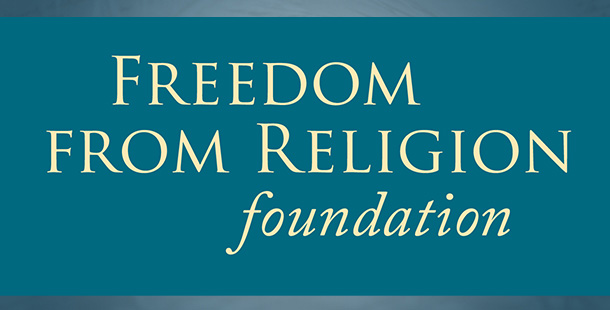
The Freedom From Religion Foundation deplores the Buffalo racial massacre by a young man who appears to be a white Christian nationalist motivated by the “replacement theory.”
The 18-year-old shooter, who is in custody, outlined his racist ideology in a long statement averring that the United States belongs only to white people. The document attributed to the shooter called everyone else “replacers” who should be eliminated by force or terror. His document said the attack was intended to intimidate all nonwhite, non-Christian people and get them to leave the country.
The deadly shooting follows other hate crimes against Jews and racial minorities, including the 2018 Pittsburgh synagogue attack killing 11 by a white man blaming them for allowing immigrant “invaders.” In 2019, 23 people were shot dead at an El Paso Walmart by a white man who admitted he wanted to kill Mexicans over “the Hispanic invasion of Texas.” Preceding these shootings was the 2017 deadly rally in Charlottesville, Va., by white racists, many with Christian nationalist ties, and the shooting of nine Black worshippers at a church in Charleston, S.C., by a white religionist in 2015.
The New York Times recently ran a lengthy exposé of Fox News commentator Tucker Carlson, citing more than 400 episodes in which he has propounded the “replacement theory.” Replacement theory, briefly, claims Democrats and others want to force demographic change through immigration. It keeps on turning up in campaigns and even in congressional hearings, according to The Times.
The “Replacement theory,” also called the “Great Replacement” belief, correlates with Christian nationalist views, according to a survey by Public Religion Research Institute.
“The basic storyline of white Christian nationalism is simple, and you’ve assuredly heard it before: America was founded as a Christian nation by (white) Christians based on 'biblical' (meaning 'Protestant') principles,” explains Yale Professor Philip Gorski. “America's white, Christian heritage is, adherents claim, the source of America's power and prosperity — both of which they believe are threatened by the increasing number of nonwhites, non-Christians and noncitizens on American soil.”
Almost all of the victims in Buffalo were Black individuals, including shoppers, grocery workers and a security guard, with the shooter choosing a section of town with a large Black population, which he scoped out the day before.
“While our nation’s constant mass shootings are all tragic, the racial hate and animus behind these particular shootings is frightening and appalling,” says FFRF Co-President Annie Laurie Gaylor. “White Christian nationalist ideology, which is spreading, has a lot to answer for and should be condemned by all caring Americans.”

The Freedom From Religion Foundation is pleased to bestow a South Dakota high school student with its $1,000 student activist award for her objections to her school board starting its meetings with Christian prayer.
Shaye Beardsley, a senior at Stevens High School, has been granted the “Strong Backbone Student Activist Award” after she spoke up at the April 5 meeting of the Rapid City Area Schools board against its recent practice of inviting clergy to pray at meetings.
The Freedom From Religion Foundation received a complaint about the school board opening with an invocation in October of last year and sent a letter. After no reply, FFRF Legal Fellow Karen Heineman followed up with an open records request in January. She again received no response. In the meantime, a few adults in the community had voiced displeasure about the prayers in comments during the meeting.
At the April meeting, Beardsley spoke up on behalf of herself, as well as several other students, including a Christian student who said it was not only unconstitutional but unkind to force the religion on those who don’t practice Christianity. Beardsley’s testimony included a recitation of the Supreme Court decision against official school prayer. With a flourish, she ended her short testimony by adding, “Almost all of these people can vote in the next election.”
She explained the reasons for her intervention to FFRF.
“The issue that I addressed in that specific meeting was about the invocation that is recited at the beginning of every meeting,” she said. “Every time the prayer is said, it is always a Christian prayer invoked by a Christian minister. Not only does this prayer alienate students who don’t believe in Christianity, it also creates an environment that makes some people feel unsafe and/or unwelcome. This results in less communication between viewpoints as a specific group is being alienated from the place that it is supposed to go to feel seen and heard.”
Demonstrating the problem, Pastor James Moore from Journey Church was formally introduced at the board meeting on April 5 and intoned, “Lord, all authority is given by you and you’ve placed anyone in authority in their position … to make godly decisions for our children in Jesus’ name. Amen.”
Beardsley’s interests include activism, reading, music and playing softball.
“I plan to take a gap year on the West Coast and get in-state tuition for college,” she tells FFRF. “My major is still undecided but will most likely be something along the lines of journalism or international relations.”
FFRF is impressed with the spirit of student outspokenness that Beardsley represents — and will persist in its work to ensure that such activism is supported.
“FFRF will continue to educate the school board on the inappropriateness of mixing prayer and public school business, especially given the fact that students are present,” remarks Heineman.
FFRF Co-President Annie Laurie Gaylor says, “We’re proud of Shaye. She’s the one teaching the school board what they should already know. It’s the height of ego to invite clergy who assert these particular school board members were placed on the school board by God to make ‘godly decisions’ for children ‘in Jesus’s name’! No, they were placed there by taxpayers to run an entirely secular school district, whose purpose is to educate, not indoctrinate.”
The $1,000 annual scholarship is financed by an octogenarian FFRF member who gives the scholarship on his birthday to encourage and reward activism by freethinking students.
The Freedom From Religion Foundation, a nonprofit founded in 1978, represents more than 37,000 nonreligious members nationally and works as a state/church watchdog to uphold the separation of state and church.
Your state has at least one anti-abortion law on the books that will make abortion illegal in your state if Roe v. Wade falls within the next month or so. Anti-abortion “trigger” laws would take effect immediately.
Alabama
Pre-Roe ban: Law enacted before 1973 and never removed
Near-total ban: A law enacted after Roe to prohibit abortion under all or nearly all circumstances
State constitution bars protection: Constitution has been amended to prohibit any protection for abortion rights
Arkansas
Pre-Roe ban: Law enacted before 1973 and never removed
“Trigger” ban: A law designated to take effect automatically or by quick state action
Georgia
Six-week ban: Law that prohibits abortion before most people even know they are pregnant
Six-week ban: Law that prohibits abortion before most people even know they are pregnant
Iowa
Six-week ban: Law that prohibits abortion before most people even know they are pregnant
Idaho
“Trigger” ban: A law designated to take effect automatically or by quick state action
Six-week ban: Law that prohibits abortion before most people even know they are pregnant and creates bounty for those who “aid and abet” in abortion
Kentucky
“Trigger” ban: A law designated to take effect automatically or by quick state action
Six-week ban: Law that prohibits abortion before most people even know they are pregnant
Louisiana
“Trigger” ban: A law designated to take effect automatically or by quick state action
Near-total ban: A law enacted after Roe to prohibit abortion under all or nearly all circumstances
Six-week ban: Law that prohibits abortion before most people even know they are pregnant
State constitution bars protection: Constitution has been amended to prohibit any protection for abortion rights
Mississippi
Pre-Roe ban: Law enacted before 1973 and never removed
“Trigger” ban: A law designated to take effect automatically or by quick state action
Six-week ban: Law that prohibits abortion before most people even know they are pregnant
Missouri
“Trigger” ban: A law designated to take effect automatically or by quick state action
Eight-week ban: Law that prohibits abortion before most people even know they are pregnant
North Dakota
“Trigger” ban: A law designated to take effect automatically or by quick state action
Six-week ban: Law that prohibits abortion before most people even know they are pregnant
Ohio
Six-week ban: Law that prohibits abortion before most people even know they are pregnant
Oklahoma
Pre-Roe ban: Law enacted before 1973 and never removed
“Trigger” ban: A law designated to take effect automatically or by quick state action
Near-total ban: A law enacted after Roe to prohibit abortion under all or nearly all circumstances
Six-week ban: Law that prohibits abortion before most people even know they are pregnant
South Carolina
Six-week ban: Law that prohibits abortion before most people even know they are pregnant
South Dakota
“Trigger” ban: A law designated to take effect automatically or by quick state action
Six-week ban: Law that prohibits abortion before most people even know they are pregnant
State constitution bars protection: Constitution has been amended to prohibit any protection for abortion rights
Texas
Pre-Roe ban: Law enacted before 1973 and never removed
“Trigger” ban: A law designated to take effect automatically or by quick state action
Six-week ban: Law that prohibits abortion before most people even know they are pregnant and creates bounty for those who “aid and abet” in abortion
Utah
“Trigger” ban: A law designated to take effect automatically or by quick state action
Near-total ban: A law enacted after Roe to prohibit abortion under all or nearly all circumstances
West Virginia
Pre-Roe ban: Law enacted before 1973 and never removed
State constitution bars protection: Constitution has been amended to prohibit any protection for abortion rights
Wyoming
“Trigger” ban: A law designated to take effect automatically or by quick state action
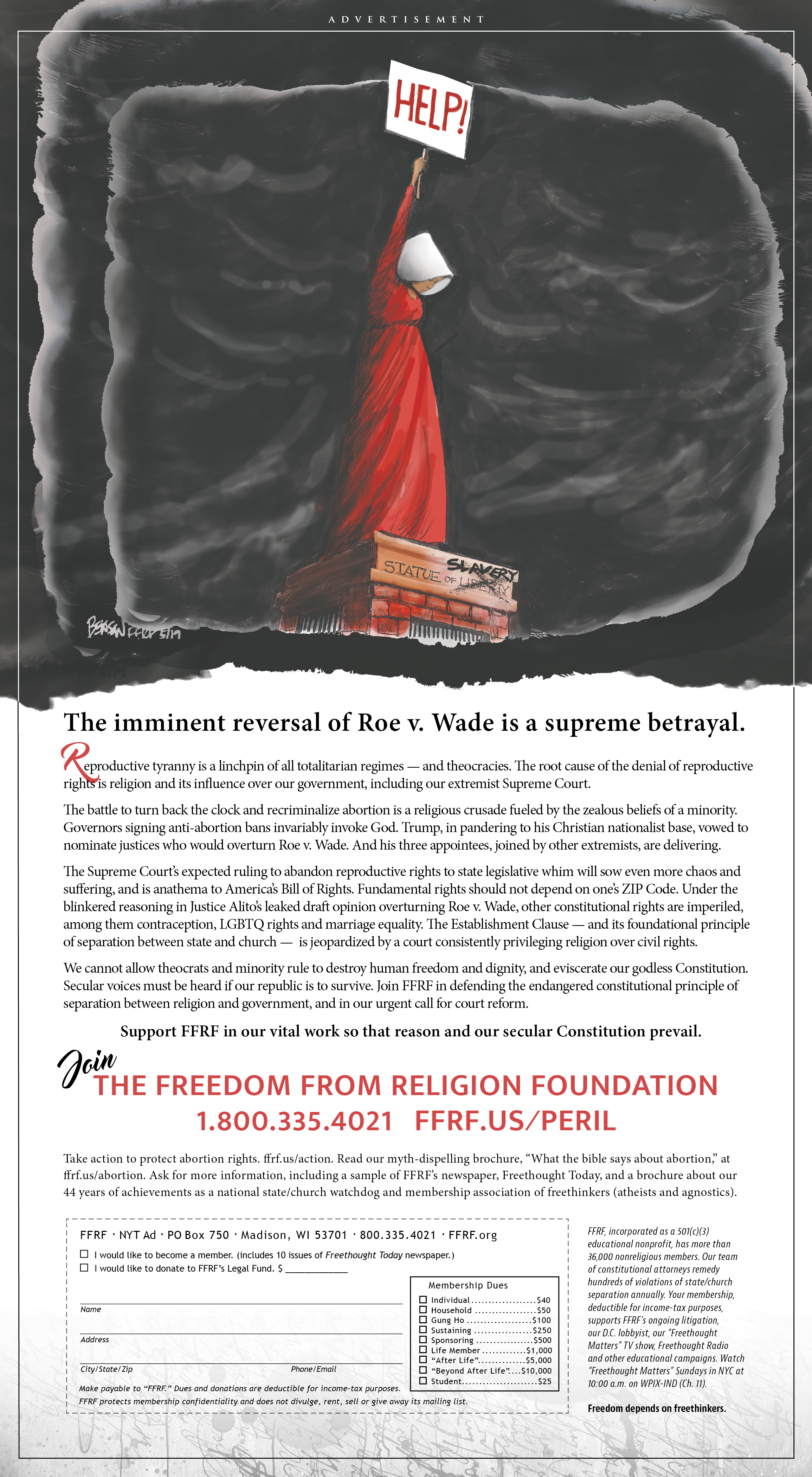 The Freedom From Religion Foundation has a powerful full-page ad in the main news section of today’s New York Times showing the Statue of Liberty enshrouded in “Handmaid’s Tale” garb, with the word “Liberty” crossed out.
The Freedom From Religion Foundation has a powerful full-page ad in the main news section of today’s New York Times showing the Statue of Liberty enshrouded in “Handmaid’s Tale” garb, with the word “Liberty” crossed out.
That illustration, by Pulitzer Prize-winning cartoonist Steve Benson, is accompanied by text noting, “The battle to turn back the clock and recriminalize abortion is a religious crusade fueled by the zealous beliefs of a minority. … The Supreme Court’s expected ruling to abandon reproductive rights to state legislative whim will sow even more chaos and suffering, and is anathema to America’s Bill of Rights. Fundamental rights should not depend on one’s ZIP Code.”
Warning that other constitutional rights are imperiled, FFRF notes that the foundational principle of separation between state and church “is jeopardized by a court consistently privileging religion over civil rights.”
The ad also notes that Donald Trump, in pandering to his Christian nationalist base, vowed to nominate justices who would overturn Roe v. Wade. “And his three appointees, joined by other extremists, are delivering.”
The appeal ends, “We cannot allow theocrats and minority rule to destroy human freedom and dignity, and eviscerate our godless Constitution. Secular voices must be heard if our republic is to survive. Join FFRF in defending the endangered constitutional principle of separation between religion and government, and in our urgent call for court reform.”
FFRF thanks its members for making possible such advertising. To help with more public relations campaigns, please designate “Advertising” on the donation dropdown.
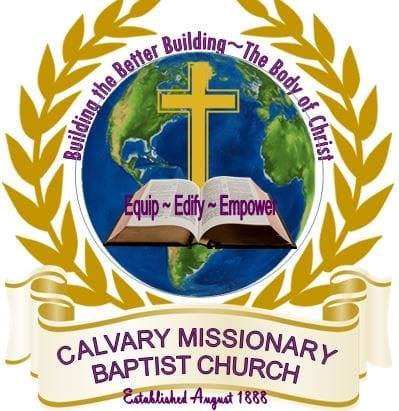
A Florida city must reject a local church’s request for tens of thousands of dollars in taxpayer money to refurbish a swimming pool, the Freedom From Religion Foundation is insisting.
A concerned resident has informed the national state/church watchdog that the Palatka City Commission plans to consider a $35,000 request from Family Life Center representatives to help reopen the center’s indoor pool at a meeting later today, May 12. The city is also considering entering into a partnership with Family Life Center as part of this expenditure of taxpayer funds.
The Family Life Center is owned and operated by the Calvary Missionary Baptist Church, which “exists for the purpose of: Magnifying Jesus Christ through worship and the Word, Moving believers in Jesus toward maturity and ministry, and Making Jesus known to our neighbors and the nations.” The Family Life Center is not a distinct entity from the church, and serves the same purpose of spreading Christianity. The center would undoubtedly use its pool to entice those in the community to come to the center where it could then recruit them to join the church.
The city of Palatka cannot use public funds to essentially repair a church’s pool, FFRF asserts.
“Our Constitution’s Establishment Clause — which protects Americans’ religious freedom by ensuring the continued separation of religion and government — dictates that the government cannot in any way endorse religion,” FFRF Staff Attorney Chris Line writes to Palatka Mayor Terrill Hill. “As the Supreme Court has put it: ‘The First Amendment mandates governmental neutrality between religion and religion, and between religion and nonreligion.’”
The Establishment Clause of the First Amendment also prohibits the government from funding religious worship and proselytization, both of which regularly occur at the Family Life Center, and would no doubt be more effective if the city gives the church $35,000. It is important to note that the free exercise rights of the church are not at issue in this situation, FFRF emphasizes, because it is requesting that the city expend discretionary funds and has not applied for a publicly available grant.
The separation between state and church is one of the most fundamental principles of our system of government, FFRF underscores. The Supreme Court has specifically stated, “If there is any fixed star in our constitutional constellation, it is that no official, high or petty, can prescribe what shall be orthodox in politics, nationalism, religion, or other matters of opinion or force citizens to confess by word or act their faith therein.” (West Virginia Board of Education v. Barnette, 1943) When a city expends $35,000 of taxpayer funds in order to support a religious organization, reasonable citizens will interpret this as government endorsement of religion.
The city of Palatka cannot spend taxpayer funds to support religion, FFRF emphatically concludes.
“With all the various urgent demands on public funds, the last thing that precious taxpayer money should be bestowed on is a church swimming pool,” says FFRF Co-President Annie Laurie Gaylor. “It is especially an affront to residents who follow a religion other than Christianity and its Baptist sect, or who belong to no organized religion at all.”
Read FFRF’s letter to the Palatka mayor here.
The Freedom From Religion Foundation is a national nonprofit organization with more than 37,000 members and several chapters across the country, including nearly 1,800 members and a chapter, Central Florida Freethought Community, in the state. Our purposes are to protect the constitutional principle of separation between state and church, and to educate the public on matters relating to nontheism.
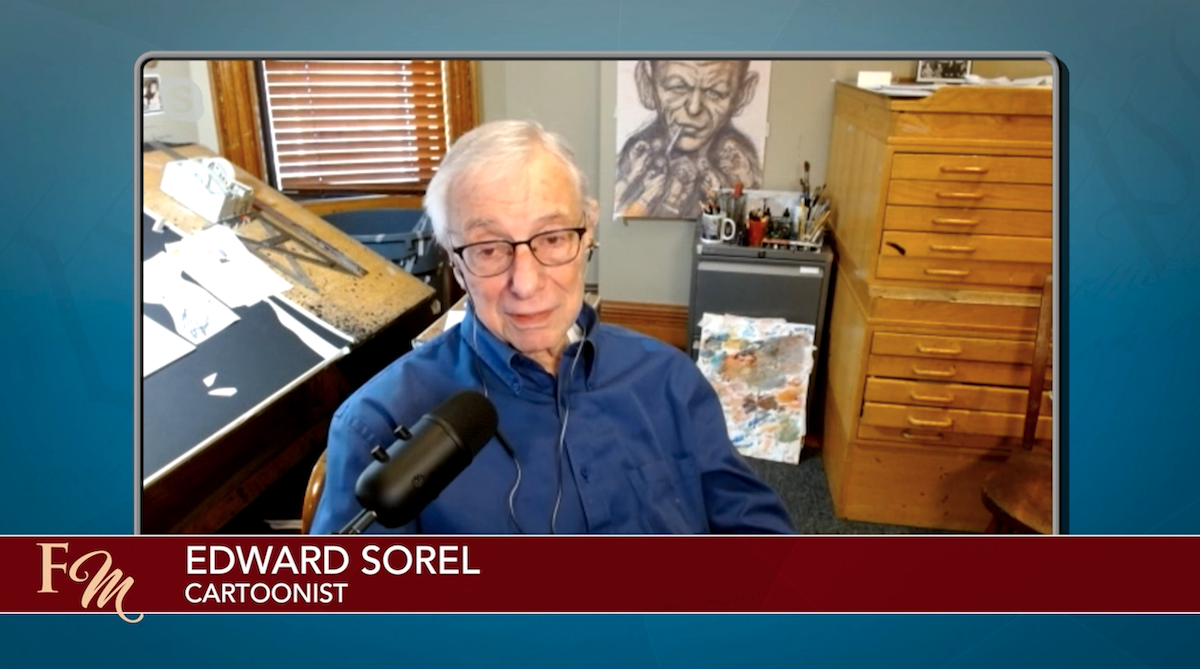
Click here to watch the teaser.
You’re in for an illustrative treat in an interview with an illustrious illustrator on the Freedom From Religion Foundation’s “Freethought Matters” TV show this Sunday.
Edward Sorel charts his remarkable life and irreverent artwork in his new memoir, Profusely Illustrated. His art has appeared in prestigious publications, such as The New Yorker, for which he’s drawn numerous covers, The Atlantic, Vanity Fair and The Nation. His drawings have been featured in newspapers, such as The New York Times and even in FFRF’s newspaper, Freethought Today, and as murals, cartoons and comic strips. Sorel has many previous books, including Mary Astor’s Purple Diary, Unauthorized Portraits and Making the World Safe for Hypocrisy. FFRF is proud that Sorel is an honorary director of the organization, and is delighted to feature a visually showcased discussion of his work.
“It’s nice to get paid for making pictures,” Sorel tells “Freethought Matters” co-hosts Dan Barker and Annie Laurie Gaylor. “I can't think of any better way of getting through life than doing what I want to do and getting paid for it.”
The episode is “profusely illustrated,” spotlighting Sorel’s artistic commentary on religion and politics.
If you don’t live in the quarter-plus viewership of the nation where the show broadcasts on Sunday, you can already catch the interview on the “Freethought Matters” playlist on FFRF’s YouTube channel. New shows go up every Thursday. You can also receive notifications when we post new episodes of “Freethought Matters” by subscribing to FFRF’s YouTube channel.
“Freethought Matters” airs in:
- Chicago, WPWR-CW (Ch. 50), Sundays at 9 a.m.
- Denver, KWGN-CW (Ch. 2), Sundays at 7 a.m.
- Houston, KIAH-CW (Ch. 39), Sundays at 11 a.m.
- Los Angeles, KCOP-MY (Ch. 13), Sundays at 8:30 a.m.
- Madison, Wis., WISC-TV (Ch. 3), Sundays at 11 p.m.
- Minneapolis, KSTC-IND (Ch. 45, Digital Channel 5.5), Sundays at 9:30 a.m. (Digital channel 5.2 has been dropped.)
- New York City, WPIX-IND (Ch. 11), Sundays at 10 a.m.
- Phoenix, KASW-CW (Ch. 61, or 6 or 1006 for HD), Sundays at 8:30 a.m.
- Portland, Ore., KRCW-CW (Ch. 32), Sundays at 9 a.m. Comcast channel 703 for High Def, or Channel 3.
- Sacramento, KQCA-MY (Ch. 58), Sundays at 8:30 a.m.
- San Francisco, KICU-IND (Ch. 36), Sundays at 10 a.m.
- Seattle, KONG-IND (Ch. 16 or Ch. 106 on Comcast). Sundays at 8 a.m.
- Washington, D.C., WDCW-CW (Ch. 50 or Ch. 23 or Ch. 3), Sundays at 8 a.m.
Upcoming shows will include an interview with “This Is Us” star and freethinker Jon Huertas, and in the final show of the spring season (before “Freethought Matters” takes a summer hiatus) a special on-location chat with sculptor Zenos Frudakis in his Pennsylvania studio. Among the highlighted sculptures is a memorial to Thomas Paine. “Freethought Matters” is now in its sixth season. To watch earlier shows, including an interview with freethinker and feminist icon Gloria Steinem, visit the “Freethought Matters” playlist on FFRF’s YouTube channel. Please tune in to “Freethought Matters” . . . because freethought matters.
P.S. Please tune in or record according to the times given above regardless of what is listed in your TV guide (it may be listed simply as “paid programming” or even be misidentified). To set up an automatic weekly recording, try taping manually by time or channel. And spread the word to freethinking friends, family or colleagues about a TV show, finally, that is dedicated to providing programming for freethinkers!
FFRF: Abortion rights senatorial defeat dismaying
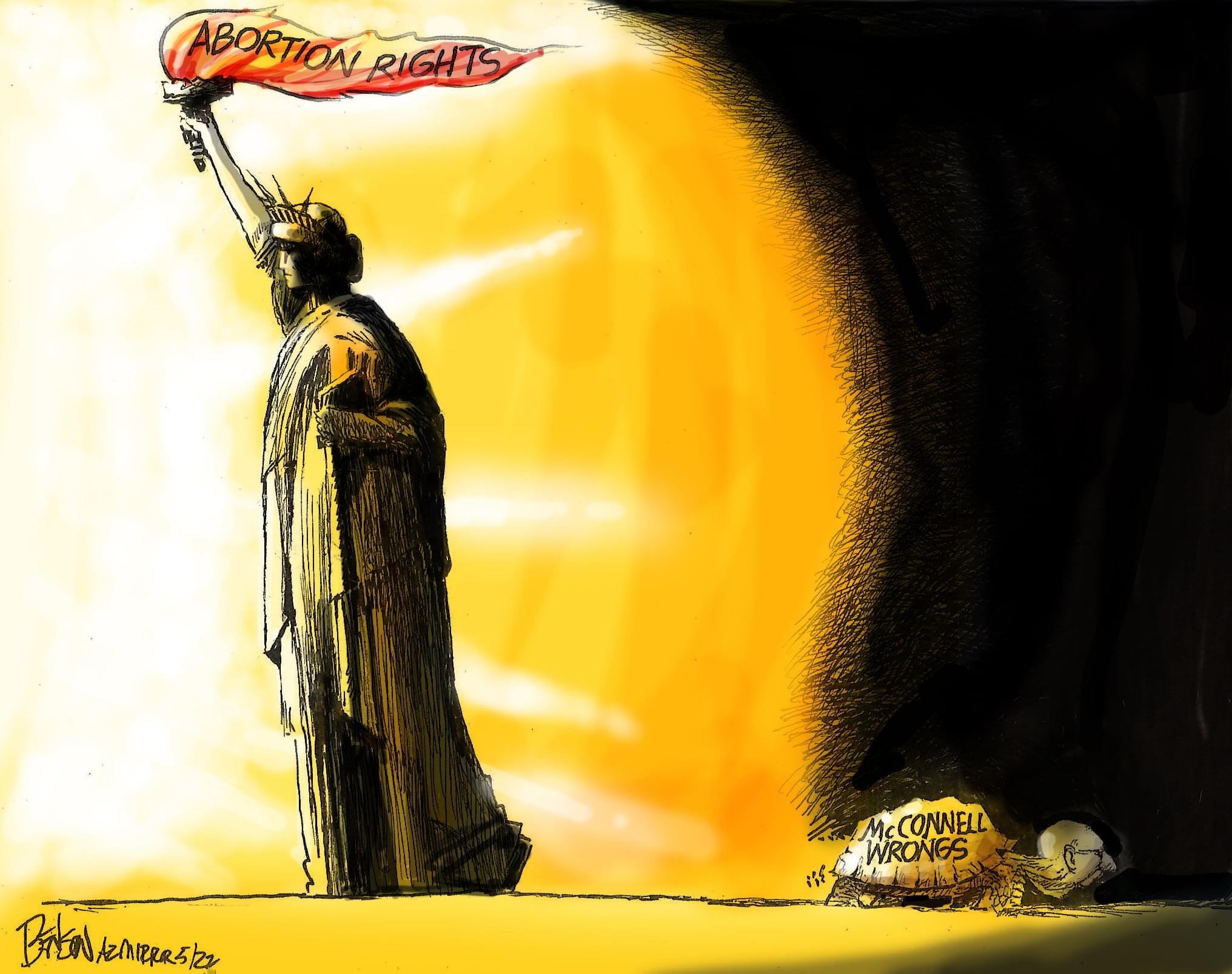
The Freedom From Religion Foundation condemns U.S. senators who failed to support the Women’s Health Protection Act.
The Women’s Health Protection Act not only would codify the provisions of Roe v. Wade, should the Supreme Court overturn the 1973 law legalizing abortion nationwide (as expected) but also would override many state laws that put unnecessary barriers in the way of abortion patients. While the vote expectedly failed, it was an important symbolic step to put senators on the record, following last week’s leak of a draft opinion by Supreme Court Justice Samuel Alito overturning Roe v. Wade. The House has passed the act, but it has been stymied in the Senate.
As if killing the Women’s Health Protection Act is not bad enough, Senate Minority Leader Mitch McConnell has indicated his interest in passing a federal ban on abortion once the high court overturns Roe. Such a ban would overturn pro-choice protections being adopted so far by about a quarter of the states. Such provisions include codifying abortion rights, passing “safe habor” laws to welcome citizens seeking abortions from anti-abortion states, as well as laws to ensure access to medication abortion.
“The extremist, anti-abortion, male-dominated Christian nationalists in Congress, the Supreme Court and a majority of state legislatures are relentless in seeking their dystopian objective of denying reproductive liberty and bodily autonomy to half its citizens,” warns FFRF Co-President Anne Laurie Gaylor. “Secular voices must counter this theocratic crusade.”
The Senate vote makes clear that reproductive and other rights are in peril.
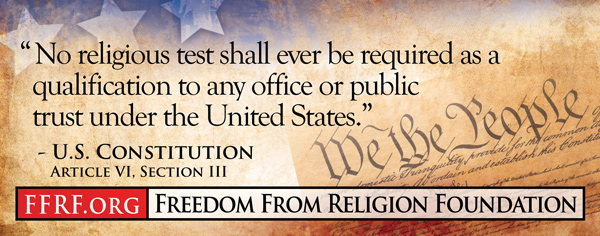
You need to get rid of your discriminatory and exclusionary oath, the Freedom From Religion Foundation is recommending to the state of New Jersey.
New Jersey statutes require a religious oath to assume any state office. As required by N.J.S.A. 41: 1-2: “Every person who shall be appointed or elected to any office . . . under the authority of [the] state . . . shall . . . take and subscribe the oath of allegiance prescribed by section 41:1-1.” The oath in section 41:1-1 requires the person assuming office to “solemnly swear (or affirm)” to uphold the U.S. and New Jersey Constitutions. The oath ends with “So help me God.”
An individual is required to sign this oath to qualify to be placed on the ballot for an election. When the Division of Elections was contacted regarding an alternative to the religious oath, the division responded that it didn’t allow for a secular affirmation because the oath was required by state statute.
An affirmation is parenthetically allowed in the statute in place of an oath, FFRF points out. This is an important distinction because an oath is a declaration or pledge to a god, while an affirmation is a solemn vow without reference to a religious entity. Requiring a reference to “God” is contrary to parenthetically suggesting an affirmation is allowed, FFRF maintains. And that’s the least of it.
“First and foremost, Article 6 of the United States Constitution prohibits the government from requiring any kind of religious test for public office,” FFRF Legal Fellow Karen Heineman writes to New Jersey Acting Attorney General Matthew J. Platkin. “In the bedrock case examining a requirement for an oath for public office, the U.S. Supreme Court held that ‘neither a state nor the federal government can constitutionally force a person “to profess a belief or disbelief in any religion.’ … Likewise, requiring someone who is running for elected office in New Jersey to profess to a god in which they do not believe would make a mockery out of the oath and the solemn promise to support the Constitution.”
In addition, the New Jersey Constitution mirrors the federal Constitution by prohibiting a religious test “as a qualification for any office or public trust,” (Article I, paragraph 4). And the oath for state legislators is defined and does not reference any god. (Article IV, section VIII, paragraph 1). This section also specifically states that an oath or affirmation is allowed. Plus, the state Constitution allows for an oath or affirmation for public officers and employees (Article VII, section I, paragraph 1).
FFRF successfully brought suit recently in federal court against the state of Alabama for requiring voters to sign a statement on the voter registration form that ended with “so help me God” with no secular option offered. The state responded to our initial communications by disingenuously stating there were no alternatives. The case was settled, and the form now includes an option to decline the last four words.
Citizens cannot be forced to pose as religious or violate their freedom of conscience in order to exercise a basic right, FFRF asserts. This is the reason New Jersey cannot require a citizen who wants to run for political office to swear to a god to gain access to the ballot. A secular affirmation must be offered as an option when an oath is required for a public office, including the right to run for office, FFRF concludes. That’s why the state/church watchdog is asking the New Jersey attorney general’s office to inform it of the process by which a candidate for office may choose a secular affirmation.
“Our secular Constitution bars any religious test for public office, and that’s what this oath amounts to,” says FFRF Co-President Annie Laurie Gaylor. “This needs to be fixed to bring the Garden State into the secular age.”
Read FFRF’s letter to the New Jersey acting attorney general here.
The Freedom From Religion Foundation is a national nonprofit organization with more than 36,000 members, including nearly 700 members in New Jersey. Our purposes are to protect the constitutional principle of separation between state and church, and to educate the public on matters relating to nontheism.

A cheery billboard message boldly proclaiming “The Good News Is . . . THERE IS NO HELL” has gone up in the heart of northwest Arkansas and will be up until the end of May.
The digital board is north of Elm Springs Road, behind the Walmart Supercenter in Springdale, visible from Interstate 49 on a highly trafficked corridor. The display is generously underwritten by Chris Sweeny, an Arkansas member of the Freedom From Religion Foundation who says “he has fallen in love with this area of Arkansas, but would like to see a greater separation between church and state.” He adds, “We look to raise awareness and bring attention to this issue.”
FFRF is a nationwide organization composed of more than 36,000 nonreligious Americans that also works diligently as a state/church watchdog. Its team of attorneys typically end more than 200 entanglements between religion and government every year, and the organization sues over First Amendment infractions. In addition, FFRF educates the public about the views of individuals like Sweeny who are personally free from religion, now comprising 29 percent of the U.S. adult population.
“We’re delighted to bring our good news to Walmart country,” says FFRF Co-President Dan Barker, a former evangelical minister who became an atheist in his mid-30s and is the author of many books, including Godless. “Our members agree with the Lennon song, ‘Imagine.’ There is no hell below us, above us only sky. Life is its own reward.”
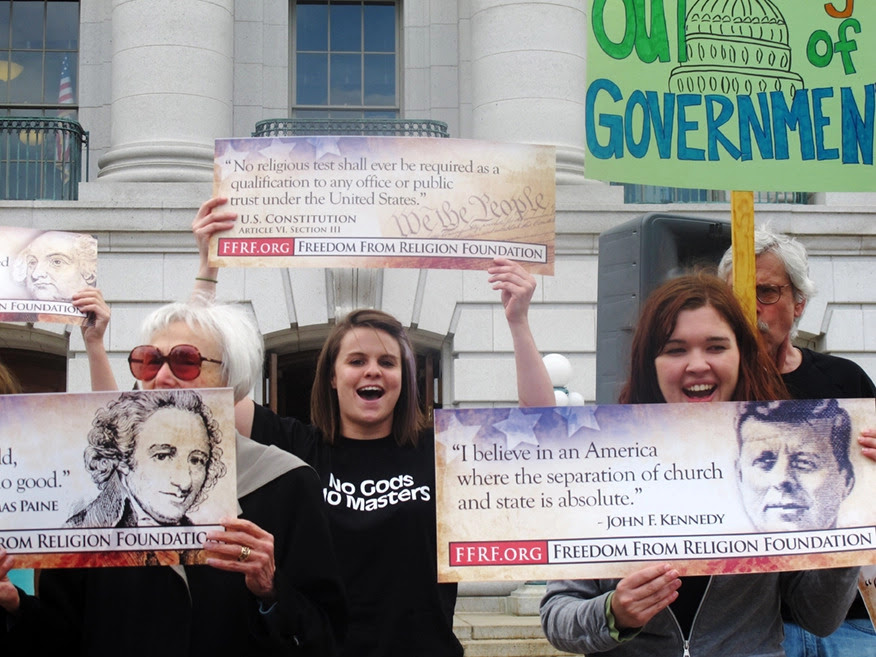
The annual unconstitutional presidential proclamation of a “Day of Prayer” is a degrading “Declaration of Dependence” by a nation predicated on the Declaration of Independence and a godless secular Constitution. President Biden’s dutiful 2022 proclamation also erases the very existence of nonreligious Americans, as all previous presidential Day of Prayer proclamations have done.
A misguided 1952 congressional law requires the president to issue a National Day of Prayer proclamation, now on the first Thursday of May, during which “the people of the United States may turn to God in prayer and medication at churches, in groups, and as individuals.” This annual ritual was suggested by evangelist Billy Graham, who said: “What a thrilling, glorious thing it would be to see the leaders of our country today kneeling before Almighty God in prayer.” So much for a secular purpose. The law and the endless vaporous proclamations it inspires every year at all levels of government degrade the secular principle upon which the United States was founded.
The Constitution, which is godless, notably bars religious tests for public office. Yet the highest office in the land is instructed by an act of Congress to inveigh upon citizens to grovel before an imaginary supernatural force to do our work here on Earth for us. Isn’t that itself a religious test for the president? It certainly implies a religious test to even be an American, because the proclamation assumes all Americans believe in a god, and one who answers prayer.
Biden’s dutiful proclamation makes this same assumption. “Americans of nearly every background and faith have turned to prayer for comfort and inspiration,” he states. Yet today, three in 10 Americans are unaffiliated with religion. “The Nones” at 29 percent are the single largest “denomination” by religious identification, outnumbering Roman Catholics who are about 20 percent of the population. But we nonreligious folk still need to pinch ourselves to know we exist in the political discourse.
Biden’s proclamation, while perfunctory, catalogs a list of “some of the greatest challenges humanity has ever faced — saving our planet from the existential threat of climate change; responding to attacks on democracy at home and abroad; and living up to our Nation’s promise of liberty, justice and equality for all.”
As Anne Gaylor, the principal founder of the Freedom From Religion Foundation, always observed: “Nothing fails like prayer.” It is pandering and cravenly for public officials and citizens to rely on prayer, instead of rolling up our sleeves and solving our own problems. How convenient to exhort a deity to magically solve global crises.
The Freedom From Religion Foundation is proud we challenged the constitutionality of the National Day of Prayer, a case we never worked harder on. Our lawsuit uncovered the fact that the statute was based on a lie — the lie that the Founders prayed at the Constitutional Convention, which they did not — and we uncovered its theocratic origins. We lost the challenge not on the merits, but on standing at the appellate level in 2011. But we still savor the magnificent ruling by U.S. District Judge Barbara Crabb of Wisconsin, who wrote an eloquent decision which all secularists should read. She noted, “The same law that prohibits the government from declaring a National Day of Prayer also prohibits it from declaring a National Day of Blasphemy.” She further wrote: “ . . . recognizing the importance of prayer to many people does not mean that the government may enact a statute in support of it, any more than the government may encourage citizens to fast during the month of Ramadan, attend a synagogue, purify themselves in a sweat lodge or practice rune magic.”
There has been notably less political fealty to the National Day of Prayer since FFRF exposed its history and its links to a private, Christian nationalist outfit that bullied all the governors to sign its bible-based proclamations and held exclusionary public events. But it’s still a bad law based on a lie — unfortunately engendering the perception that religion and government are united.
